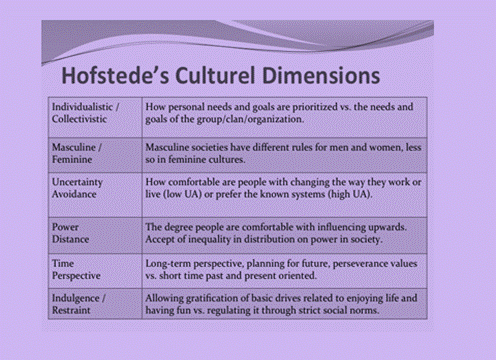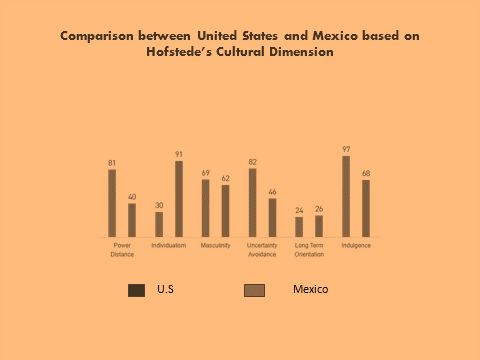
To determine:
Using Hofstede's data for Mexico and the United States determine how employees of both these countries might react
a. to a team based rewards program
b. would view their relationship with their boss
c. might react to change in the work process
Introduction:
Greet Hofstede had conducted a study into the differences that existed in the cultural environment. This massive research was conducted way back in the 1970s and 1980s wherein the 116,000 employees of IBM across 40 countries were surveyed. Their values related to work were studied and it was found that the employees of IBM and the managers of the company varied on five specific dimensions of national culture. These dimensions can be studied in the table given below

Source: Based on G. Hofstede, "Motivation, leadership, and Organisation: Do American Theories Apply Abroad?
Answer to Problem 1DT
Solution:

Source: Based on G. Hofstede, "Motivation, leadership, and Organisation: Do American Theories Apply Abroad?
Explanation of Solution
a. to a team based rewards program
The United States has a high individual score of 91 which reveals that Americans are individualists and would not react with enthusiasm to a team based rewards program. There is a concept of individualism in the U.S and the relation the employees share with their team and organization is usually calculative and based on self-interest. Mexico, on the other hand, has a low individual score of 30 is considered to be a society which believes in collectivism. Therefore, the employees in Mexico would react with enthusiasm to a team based rewards program. The employees in Mexico being high on collectivism believe in strong relationships where each employee of the team takes responsibility for their fellow team members.
b. would review their relationship with their boss
The United States has a low power distance score of 40, which means that power distribution in the U.S is relatively equal and employees will review their relationship with their boss a one where the subordinates are treated with equality. Mexico on the other has a high power distance score of 81 which means that employees in Mexico will review their relationship with their boss as that of a superior and subordinate. A high power distance score means power is distributed unequally in the organizations. Mexico has an organizational culture where the boss tells the subordinates what needs to be done and the organizations have a hierarchical structure.
c. Might react to change in the work process
The U.S has a low uncertainty avoidance score and it means that employees in the United States are open to innovation, new ideas and have the willingness to try out new changes. Therefore, they are likely to react positively to any change in the work process. Mexico, on the other hand, has a high uncertainty avoidance score and prefer avoiding any kind of uncertainty. The employees in Mexico will therefore not react positively to changes to the work process. The employees in Mexico prefer rules and have a tendency to resist innovation or change.
Therefore, the above discussion brings forth how employees in U.S and Mexico will react to three different kinds of situations.
Want to see more full solutions like this?
Chapter 3 Solutions
Fundamentals of Management: Essential Concepts and Applications (9th Edition)
- This was the question asked of Jack Otto, production supervisor, by one of his manufacturing workers, Clyde Fisher. Jack had been wondering the same thing for several weeks about Bob Hill, another of his welders. Jack Otto is a 54-year-old production supervisor who has been with Store Fixture Manufacturing Co. (SFM) for 20 years. He is well liked and respected by his peers and subordinates and is very competent at the technical aspects of his supervisory job. Bob Hill, 40 years old, has been a generally competent and productive welder at SFM for ten years. Bob has been popular with his coworkers. Although he periodically "blows up" at them, he always apologizes afterward. His absenteeism rate has been higher than average for the last several years, with most absenteeism on Mondays. Also, it is not uncommon for Bob to be 10–15 minutes late at least once a week. But, because of a shortage of experienced welders and because Bob often cuts his lunch hour short to make up his tardiness…arrow_forwardSince the mid-1950s the proportion of American workers represented by unions has: A. Decreased. B. Grown only in the manufacturing sector. C. Remained about the same. D. Increased.arrow_forwardThe Occupational Safety and Health Act gives workers the right to a job: A. With wages that enable an employee to enjoy a decent standard of living. B. That does not require them to lift, bend, or move items at any time on the job. C. That is free from recognized hazards that are likely to cause death or serious injury. D. With equal wages for similar kinds of work.arrow_forward
- The right to a safe and healthy workplace is accurately described by which statement? A. Extensive training and careful precautions are necessary to avoid accidents, injuries, and illness. B. Regulations and enforcement have failed to curb worker accidents. C. Over recent years no new categories of accidents or illnesses have emerged. D. A very limited number of jobs are potentially hazardous to workers’ safety and health.arrow_forwardThe employment relationship: A. Indicate that employees are dependent on their employers for their livelihoods. B. Implies that employers depend on employees to make products, provide services, and run the organization internally. C. Refers to the relationship between employee and employer. D. All of these answers are correct.arrow_forwardThe employment relationship: A. Indicate that employees are dependent on their employers for their livelihoods. B. Implies that employers depend on employees to make products, provide services, and run the organization internally. C. Refers to the relationship between employee and employer. D. All of these answers are correct.arrow_forward
- Since the mid-1950s the proportion of American workers represented by unions has: A. Decreased. B. Grown only in the manufacturing sector. C. Remained about the same. D. Increased.arrow_forwardRomantic relationships in the workplace are described by which statement? A. Most businesses have strict policies forbidding all romantic relationships in the workplace. B. Almost all businesses ban romantic relationships between employees in the different departments. C. OSHA requires businesses to forbid workplace romantic relationships. D. Many companies allow managers to become romantically involved with subordinates, so long as they do not supervise them directly.arrow_forwardA reason for an increase in employee monitoring does not include: A. To make sure employees do not disclose confidential information. B. To reduce the employer's health insurance premiums. C. To avoid lawsuits if employees act in inappropriate ways. D. To achieve greater efficiency at work.arrow_forward
- A strong employer-employee relationship is central to: A. Achieving a corporation's environmental goals. B. Increasing the gross domestic product of a nation. C. None of these answers are correct. D. Satisfying the wishes of those who contribute their skills and talents to the company.arrow_forwardThe right to a safe and healthy workplace is accurately described by which statement? A. Extensive training and careful precautions are necessary to avoid accidents, injuries, and illness. B. Regulations and enforcement have failed to curb worker accidents. C. Over recent years no new categories of accidents or illnesses have emerged. D. A very limited number of jobs are potentially hazardous to workers’ safety and health.arrow_forwardEmployees in the United States have a legal right to: A. Organize and bargain collectively. B. A job. C. All these answers are correct. D. Months of vacation each year.arrow_forward
 Understanding BusinessManagementISBN:9781259929434Author:William NickelsPublisher:McGraw-Hill Education
Understanding BusinessManagementISBN:9781259929434Author:William NickelsPublisher:McGraw-Hill Education Management (14th Edition)ManagementISBN:9780134527604Author:Stephen P. Robbins, Mary A. CoulterPublisher:PEARSON
Management (14th Edition)ManagementISBN:9780134527604Author:Stephen P. Robbins, Mary A. CoulterPublisher:PEARSON Spreadsheet Modeling & Decision Analysis: A Pract...ManagementISBN:9781305947412Author:Cliff RagsdalePublisher:Cengage Learning
Spreadsheet Modeling & Decision Analysis: A Pract...ManagementISBN:9781305947412Author:Cliff RagsdalePublisher:Cengage Learning Management Information Systems: Managing The Digi...ManagementISBN:9780135191798Author:Kenneth C. Laudon, Jane P. LaudonPublisher:PEARSON
Management Information Systems: Managing The Digi...ManagementISBN:9780135191798Author:Kenneth C. Laudon, Jane P. LaudonPublisher:PEARSON Business Essentials (12th Edition) (What's New in...ManagementISBN:9780134728391Author:Ronald J. Ebert, Ricky W. GriffinPublisher:PEARSON
Business Essentials (12th Edition) (What's New in...ManagementISBN:9780134728391Author:Ronald J. Ebert, Ricky W. GriffinPublisher:PEARSON Fundamentals of Management (10th Edition)ManagementISBN:9780134237473Author:Stephen P. Robbins, Mary A. Coulter, David A. De CenzoPublisher:PEARSON
Fundamentals of Management (10th Edition)ManagementISBN:9780134237473Author:Stephen P. Robbins, Mary A. Coulter, David A. De CenzoPublisher:PEARSON





